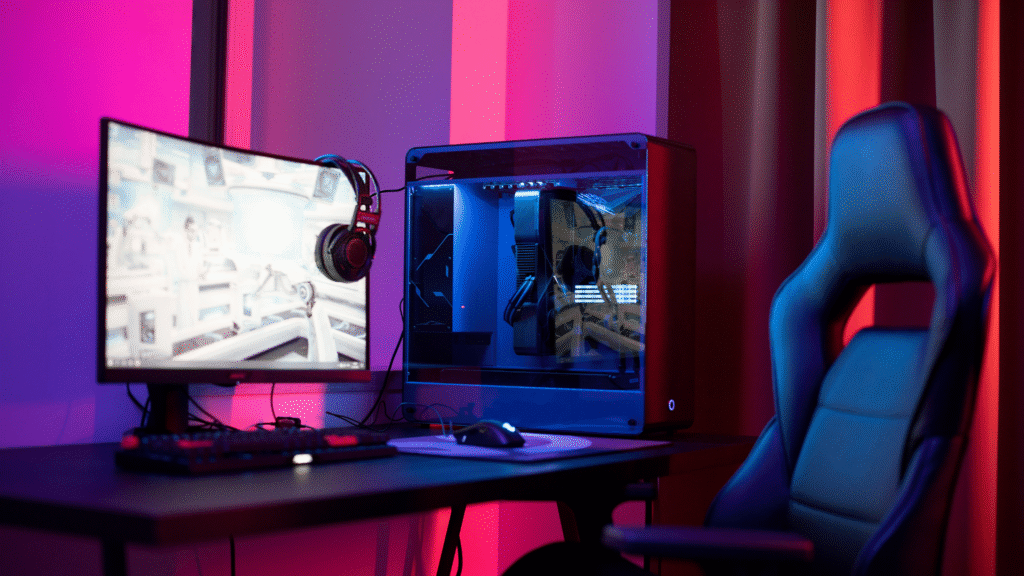Gaming has long been a topic of debate when it comes to its impact on mental health. Research indicates that while excessive gaming can lead to negative consequences, there are significant benefits when gaming is approached mindfully. Moderate gaming can enhance problem-solving skills, foster social connections, and provide a valuable outlet for stress relief.
Studies show that many gamers experience improved mood and decreased anxiety through their gaming experiences. Cooperative and multiplayer games particularly promote teamwork and social interaction, which can mitigate feelings of isolation. Engaging with these types of games can offer a sense of community that is vital for mental well-being.
As the conversation around mental health continues to evolve, understanding the balance between gaming and psychological health becomes increasingly important. This article explores the nuanced relationship between gaming and mental health, examining both the positive effects and potential pitfalls supported by scientific research.
The Relationship Between Gaming and Mental Health
Research indicates a complex interaction between gaming and mental health, highlighting both positive contributions to well-being and potential drawbacks. Understanding this relationship can inform strategies for healthy gaming habits.
Scientific Perspectives on Video Games and Well-Being
Studies have explored how video gaming impacts mental health, revealing mixed results. Some research highlights benefits in cognitive function, social connectivity, and stress relief. For instance, frequent gamers often report higher levels of positive emotion and lower levels of anxiety.
Conversely, other studies raise concerns about excessive gaming, linking it to depression, isolation, and decreased physical activity. Understanding these dynamics is essential for assessing the overall impact of gaming on individual mental health.
Positive Effects on Mental Well-Being
Video gaming can promote various aspects of mental well-being. Engaging in games often encourages problem-solving, strategic thinking, and creativity. For example, puzzle-based or role-playing games challenge cognitive skills and can enhance mental agility.
Additionally, multiplayer games foster social engagement. They create opportunities for players to build friendships and collaborate, which can alleviate feelings of loneliness. For some, gaming serves as a valuable coping mechanism, providing an escape from everyday stressors.
Potential Negative Impacts and Concerns
Despite the potential benefits, there are legitimate concerns regarding excessive gaming. Research suggests that prolonged gaming sessions may lead to addiction, adversely affecting daily responsibilities and personal relationships.
Furthermore, excessive screen time can contribute to sleep disturbances, anxiety, and reduced physical health. Individuals who game excessively may experience withdrawal symptoms when not playing, which can exacerbate mental health issues.
Awareness of these risks is crucial in navigating the relationship between gaming and mental health. Balancing gaming with other life activities can help mitigate adverse effects while preserving its positive aspects.
Gaming Behaviour, Habits, and Mental Health Outcomes
Understanding the relationship between gaming behaviour, habits, and mental health outcomes is crucial for recognising the potential risks and benefits associated with gaming. Research highlights patterns in how various demographics engage with games and the resulting effects on mental health.
Gaming Disorder and Its Recognition
Gaming disorder is characterised by persistent gaming behaviour that interferes with daily life and leads to significant impairment or distress. The World Health Organisation officially recognised this condition in the ICD-11. Symptoms may include a loss of control over gaming, prioritisation of gaming over other activities, and continued gaming despite negative consequences.
The prevalence of gaming disorder varies globally, with Japan noting increased concerns due to both cultural acceptance and extensive participation in gaming. Early identification and intervention are essential in managing this condition effectively.
Screen Time and Its Effects on Mental Wellbeing
The relationship between screen time and mental health remains complex. Excessive screen time, often linked to gaming, is associated with issues such as anxiety and depression. Studies indicate that spending more than two hours a day on screens may lead to poorer mental health outcomes for children and adolescents.
Moderate gaming, particularly with social elements, can promote interaction and support. Such engagement may mitigate some negative effects of screen time. Regular breaks and balanced activities, including physical exercise, are recommended to offset these risks.
Gaming Habits Across Different Populations
Gaming habits vary significantly across different demographic groups. For instance, younger individuals typically engage more with titles on platforms like the Nintendo Switch or PlayStation 5, favouring multiplayer gaming experiences. In contrast, older adults may prefer solitary playthroughs of narrative-driven games.
Studies show that female gamers often experience social outlet benefits that can enhance mental wellbeing, while male gamers might engage more competitively. Awareness of these differences can help in tailoring support and resources for various groups.
Console Ownership and Platform Differences
The platform on which individuals’ games can influence both behaviour and mental health. Ownership of consoles like the PlayStation 5 offers unique social gaming experiences, potentially leading to greater community engagement. Conversely, PC gaming often attracts players who prefer immersive and solitary experiences.
Different consoles can also affect the type of games available, which may impact mental health outcomes. For example, mobile gaming on platforms like smartphones may lead to increased screen time but also provides convenient social connections, especially in regions like Japan, where mobile gaming is prevalent.
Cognitive, Emotional, and Social Aspects of Gaming
Gaming influences various cognitive, emotional, and social aspects of individuals. It has been linked to changes in cognition and memory, affects emotional wellbeing, and fosters social connections, which can enhance life satisfaction.
Cognition, Memory, and Perception in Gamers
Engagement in gaming can enhance cognitive skills such as problem-solving and critical thinking. Many games require players to make quick decisions based on the information presented, which may improve their reaction times and analytical abilities.
Research indicates that gaming can also have positive effects on memory retention. Action games, for example, can improve visual memory and spatial awareness. Gamers often need to remember complex maps or sequences, leading to enhanced memory capacity. Moreover, according to studies, some games like action and fast-paced games help in visual acuity, the sharpness and accuracy of sight, by training players to respond quickly to visual cues and fine details on-screen.
Perception is another critical area impacted by gaming. Players frequently develop better sensory perception, allowing them to react swiftly to stimuli in their environment. This heightened perception may translate to improved performance in real-life tasks, such as driving or other skilled activities.
Attention and Its Links to Gaming
Attention is a significant factor in gaming, as many games require sustained focus for optimal performance. Players often need to manage multiple tasks simultaneously, which can enhance their attentional control.
Studies suggest that action games can increase both selective and divided attention. Players learn to filter out distractions while maintaining focus on crucial objectives. This skill can be beneficial in various settings, including academic and professional environments.
It is important to note that while gaming can enhance attention skills, excessive gaming may lead to attention-related issues if not balanced with other activities. Maintaining a healthy gaming lifestyle is essential for optimal cognitive benefits.
Anxiety, Depression, and Emotional Wellbeing
The relationship between gaming and mental health is complex. For some individuals, gaming serves as a coping mechanism for anxiety and depression. Engaging in immersive virtual worlds can provide an escape and reduce feelings of isolation.
However, problematic gaming behaviour can exacerbate these issues for others. Gamers struggling with emotional well-being may find that excessive screen time worsens their anxiety or depressive symptoms. It is essential for individuals to identify a healthy balance.
Games often incorporate social elements, assisting players in forming connections that contribute positively to their mental health. Such interactions can foster a sense of belonging, which is vital for emotional resilience.
Social Connection and Life Satisfaction Through Gaming
Gaming can facilitate social connections and foster friendships that enhance life satisfaction. Multiplayer games allow players to collaborate and compete, creating bonds that transcend geographical barriers.
Online gaming communities provide support networks where players share experiences and hobbies. These interactions can be particularly beneficial for individuals who may be socially isolated in their offline lives.
Research has demonstrated that regular social interactions in gaming can lead to improved emotional well-being and increased life satisfaction. Players often report a sense of accomplishment and community, which can contribute positively to their overall mental health.
Recent Scientific Studies and Key Findings
Research in gaming and mental health has revealed significant insights into the psychological impacts of video games. Various studies have explored relationships between gaming habits and mental well-being, highlighting both benefits and potential risks.
Notable Research from Oxford University
A prominent study from Oxford University focused on the effects of video gaming on well-being. Researchers assessed over 3,000 participants to investigate how gaming influences mental health.
They found that individuals who played games for moderate durations reported higher levels of life satisfaction than those who did not engage in gaming. Notably, the researchers emphasised that engagement rather than duration is crucial. Games that foster social interaction, such as multiplayer platforms, tend to promote positive mental health outcomes.
Animal Crossing, Lottery, and Emerging Trends
The game Animal Crossing: New Horizons has been extensively discussed in the context of mental health. It emerged as a tool for coping during the pandemic, providing a soothing escape and an avenue for social connections.
Additionally, researchers examined the psychological effects of lottery games, finding that those who play these games often report increased feelings of excitement. Emerging trends suggest that casual gaming can offer social support and emotional comfort, especially during challenging times.
Access Information and Consumer Insights
Access to gaming has expanded dramatically, influencing how individuals engage with these platforms. Research indicates that diverse demographics now participate in gaming, providing insights into consumer behaviour.
Surveys reveal that many players identify gaming as a means of stress relief. Furthermore, access to gaming platforms through mobile devices has made gaming more inclusive, allowing people with varying schedules to participate. Understanding these patterns is essential for developing healthier gaming environments and informing policy decisions in mental health contexts.




